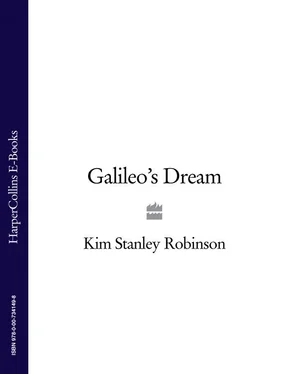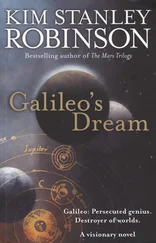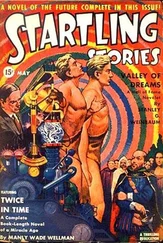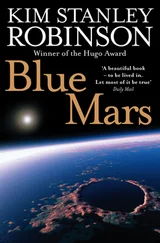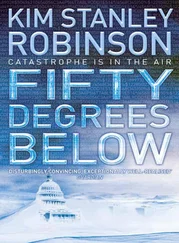-GALILEO, letter to Cosimo, 1611
And indeed he came out of this syncopeas one wakes from a dream, agitated, gasping, struggling to remember as it squirted away; you could see it in his face. ‘No,’ he moaned, ‘come back…don’t forget…’
This time it was his newly hired housekeeper who discovered him: La Piera had arrived at last. ‘Maestro!’ she cried, leaning over to peer into his staring eye. ‘Wake up!’
He groaned, looked at her without recognition. She gave him a hand, hauled him to his feet. Though a braccio shorter, she was about as heavy as he was.
‘They told me you suffer from syncopes.’
‘I was dreaming.’
‘You were paralysed. I shouted, I pinched you, nothing. You were gone.’
‘I was gone.’ He shuddered like a horse. ‘I had a dream, or something. A vision. But I can’t remember it!’
‘That’s all right. You’re better off without dreams.’
He regarded her curiously. ‘Why do you say that?’
She shrugged her broad shoulders as she tugged his clothes into position, holding up a little pellet she pulled from his jacket and then pocketing it. ‘My dreams are crazy, that’s all. Burning things in the oven while all the fish on the table come to life and start biting me, or sliding out the door like eels. They’re always the same. Rubbish I say! Life is crazy enough as it is.’
‘Maybe so.’
Then Cartophilus hustled onto the altana and came up short at the sight of them. Galileo shuddered again, pointed a finger at him: ‘You!’ he exclaimed.
‘Me,’ the ancient one admitted cautiously. ‘What is it, maestro? Why are you up?’
‘You know why!’ Galileo roared. Then, piteously: ‘Don’t you?’
‘Not I,’ Cartophilus said, shifty as always. ‘I heard voices and came out to see what was up.’
‘You let someone in. In the gate?’
‘Not I, maestro. Did you fall into one of your syncopes again?’
‘No.’
‘Yes,’ La Piera confirmed.
Galileo heaved a huge sigh. Clearly he could remember nothing, or next to nothing. He glanced up; Jupiter was nearly overhead. He was cold, he slapped his arms to warm himself. ‘Were the wolves in the hills howling earlier?’ he asked suddenly.
‘Not that I heard.’
‘I think they were.’ He sat there thinking about it. ‘To bed,’ he muttered, and stood. ‘I can’t do it tonight.’ He glanced up again, hesitated. ‘Ah, damn.’ He plopped down again on his stool. ‘I have to check them, at least. What time is it? Midnight? Bring me some mulled wine. And stay out here with me.’
Salviati was out of town, and Galileo was therefore stuck in his rented house in Florence. He found himself in a strange mood, distracted and pensive. He made it known to Vinta, in the most obsequious and flowery language he could manage, which was saying a lot, that he wanted to go to Rome to promote his new discoveries-or, as he admitted in a meeting with the Grand Duke’s secretary, to defend them. For there were a lot of serious people who simply didn’t have spyglasses good enough to see the moons of Jupiter, and even well-meaning parties like the Jesuits, the best astronomers in Europe aside from Kepler, were having trouble making the observations. And in Tuscany a new thing had happened: a philosopher named Ludovico delle Colombe was circulating a manuscript that not only ridiculed the notion that the Earth might move, but displayed a long list of quotes from the Bible to back his argument that Galileo’s idea was contrary to Scripture. These quotes included ‘You fixed the earth on its foundation’ (Psalm 104:5); ‘God made the orb immobile’ (1 Chronicles 16:30); ‘He suspended the earth above nothingness, that is, above the centre’ (Job 26:7); ‘The heaviness of stone, the weight of sand’ (Proverbs 27:3); ‘Heaven is up, the earth is down’ (Proverbs 30:3); ‘The sun rises, and sets, and returns to its place, from which, reborn, it revolves through the meridian, and is curved toward the North’ (Ecclesiastes 1:5); ‘God made two lights, i. e. , a greater light and a smaller light, and the stars, to shine above the earth’ (Genesis 1:17).
Galileo read a manuscript of this letter, given to him by Salviati to show him what was being circulated, and cursed at every sentence. ‘The heaviness of stone! This is stupid!’
Who wants the human mind put to death? he wrote angrily to Salviati. Who is going to claim that everything in the world which is observable and knowable has already been seen and discovered?
People were afraid of change. They seized on Aristotle because he said that above the sky there was no change; thus, if you died and went there, you would not change either. He wrote to the astronomer Mark Welser, I suspect that our wanting to measure the universe by our own little yardstick makes us fall into strange fantasies, and that our particular hatred of death makes us hate fragility. If that which we call corruption were annihilation, the Peripatetics would have some reason for being such staunch enemies of it. But if it is nothing else than a mutation, it does not merit so much hatred. I don’t think anyone would complain about the corruption of the egg if what results from it is a chick.
Change could be growth, in other words. It was intrinsic to life. And so these religious objections to the changes he saw in the sky were stupid. But they were also dangerous.
So he wrote weekly to Vinta, asking him to ask the bighearted brilliant splendiferous grandissimo Grand Duke to send him to Rome, so he could explain his discoveries. Eventually Galileo convinced Vinta that a visit could do no harm, indeed could add to the lustre of his prince’s reputation. The trip was therefore approved; but then Galileo fell ill again. For two months he suffered such headaches and fevers that there was no question of travel.
He recuperated at Salviati’s villa. ‘I’m embroiled in something strange,’ he confided to his young friend from out of a fever. ‘Lady Fortuna has grabbed me by the arm, she has tossed me over her shoulder. God knows where I’m headed.’
Salviati did not know what to make of this, but he was a good friend to have in a crisis. He held your hand, he looked at you and understood what you said; his liquid eyes and quick smile were the very picture of intelligent goodness. He laughed a lot, and he made Galileo laugh, and there was no one quicker to point out a bird or a cloud, or to propose a conundrum about negative numbers or the like. A sweet soul, and smart. ‘Maybe it’s La Vicuna who has taken you by the hand, the muse of justice.’
‘I wish it, but no,’ Galileo said, looking inward. ‘Lady Fortuna is the one deciding my fate. The capricious one. A big woman.’
‘But you have always been avventurato. ’
‘But with luck of all kinds,’ Galileo groused. ‘Good luck and bad.’
‘But the good has been so good, my friend. Think of your gifts, your genius. That too is Fortuna making her dispensations.’
‘Maybe so. May it continue that way, then.’
Finally, impatient at the delay forced on him by his body, he wrote to Vinta asking if a ducal litter could be provided for his travel. By this time it was becoming clear that the Sidereus Nuncius had made Galileo famous all over Europe. In the courts lucky enough to have been sent one of Galileo’s spyglasses, star parties were being held, from Bavaria and Bohemia to France and England. Vinta decided that Galileo’s presence in Rome could only bring honour and prestige to the Medici: the use of the ducal litter was approved.
On 23rd March, 1611, Galileo left with his servants Cartophilus and Giuseppe, and a little group of the Grand Duke’s horsemen. He carried with him a letter of introduction to Cardinal Maffeo Barberini, written by an old acquaintance of his, Michelangelo Buonarroti, nephew of Florence’s most famous artist, who had died the day before Galileo was born, causing talk (by Galileo’s father anyway) of a transmigration of souls.
Читать дальше
